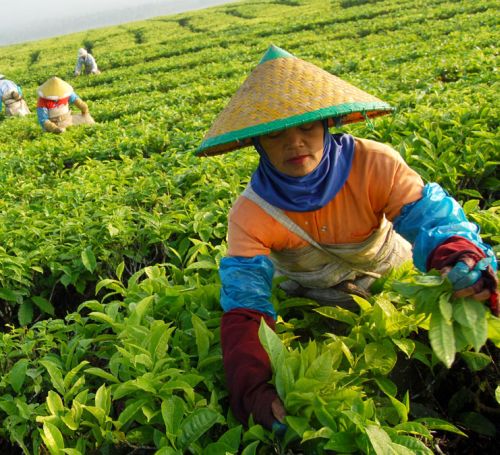10 Apr 2017

The reason is that the majority of people's plantation does not have quality seeds that can support the productivity of tea.
The Acting Director of the Tea and Cinchona Research Center (PPTK) Gambung, Luqman Erningpraja said that the share of the national tea market is actually still very interesting.
The problem is that during this time, many tea cultivations have not been in accordance with the provisions so that they can produce quality tea or best agricultural practices.
"Not a few farmers are not careful in picking tea such as old leaves that are picked, so the grade goes down. If the grade goes down, the price is also low," he told Bisnis, Wednesday (4/5/2017).
According to him, GPATN was once carried out by the government in 2014. The massive movement to save tea plantations made the need for quality and certified seeds to increase and sold up to 1,500 trees with a price of each stem reaching Rp2,000.
In one hectare, it can hold 13,000 trees. Thus, the money that must be spent to fulfill the restoration of the tea plant is quite high. So, it is reasonable if the people's tea plantations are less capable and GPATN can be the solution. PPTK is the only institution that produces superior certified tea seeds in Indonesia.
"For people's plantations, they may not be able to buy the certified seeds that are produced or they do not want to. Because usually people's plantations expect a helping hand from the government, either subsidies or other schemes," he said.
The government must intervene in GPATN, especially to provide good seeds. However, good seeds are not enough, because it will be useless if not supported by good maintenance as well.
"In the end, he will suffer. We are optimistic that the tea industry is still good as long as it is supported by good tea quality," he said.
So far, the productivity of people's tea is still low because it is below 1 ton/ha/year. In fact, what has been done on the Simalungun plantation, North Sumatra, the productivity of tea is already above 5 tons/ha/year.
Regarding the price, the tea produced is a premium class because it sells products with the best quality. In addition, his party has also gone towards organic plantations because they do not use many insecticides and pesticides.
PPTK is able to produce a variety of teas ranging from white, black, and green tea. Not only having seeds, it also has a tea processing factory with a capacity of 25 tons/day. Even so, the tea supply capacity from the tea plantation in Gambung, which covers an area of ??400 ha, is only 10 tons/day.
"Indeed, it is not yet in accordance with its capacity because productivity is still not good because throughout 2016 there was a long drought so productivity decreased. However, this year it will likely increase by 10-15%," he said.
Asked about regular consumers for his tea products, Luqman said that his party had a sales and purchase agreement with a private party. Furthermore, the private party exports it. To meet the high market demand, his party does not only rely on Gambung, but also 72 ha on the Pasir Sarongge plantation, Cianjur and 100 ha in Simalungun.
Regarding the Cinchona commodity, he admitted that it was indeed rather late in its development. However, currently there are Cinchona plantations with an area of ??20 ha. Besides that, his party also continues to rejuvenate plants.
"But that is still small and the area will continue to increase. Indeed, the market compared to tea is much larger than tea. Besides, the use of Cinchona is also limited. Moreover, for domestic use," he said.
For the Cinchona export market, there is actually, especially to meet the needs of the carbonated soft drink industry such as Coca Cola for strengthening the bitter element in the drink.
According to him, Cinchona is almost extinct due to economic factors or the quiet demand for the market. Previously, especially in the era of the Dutch East Indies, the need for Cinchona was quite high as a cure for malaria. Even so, the market is now open again because Cinchona is needed for drinks.
"Plus, it's not yet widely promoted and the trees are limited," he said.
It must be admitted that PPTK is a research center that must finance its own operational needs because there is no government assistance to pay employee salaries, research, and so on.
"If now we play around with commodities that are not yet certain, we will not get income. Here, the tree that can quickly make money is what we are working on, one of which is tea," he explained.
http://industri.bisnis.com/read/20170405/99/642834/penyelamatan-perkebunan-teh-rakyat-harus-dimulai
© Inacom. All Rights Reserved.